wp1
CLA 2022
24/06/22/12:34 Filed in: Conference participation
Concept Lattices and their Applications, CLA, Tallinn, Estonia, June 20-22, 2022
We presented four works "Fuzzy closure systems over Heyting algebras as fixed points of a fuzzy Galois connection" (by Emilio Muñoz and other colleagues in the department, Manuel Ojeda-Hernández presented the paper), "Revisiting Algorithms for Fuzzy Concept Lattices" (by Domingo López and other colleagues in the department), and "Partial formal contexts with degrees" and "On the affordance-theoretic bases of the landscape of knowledge paradigm" (by Manuel Ojeda-Aciego and others).
Back to the onsite format conference, with interesting invited talks by our colleagues and co-authors Peter Vojtáš and Bernard De Baets.
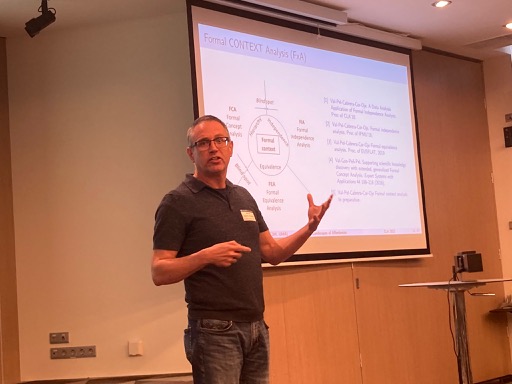
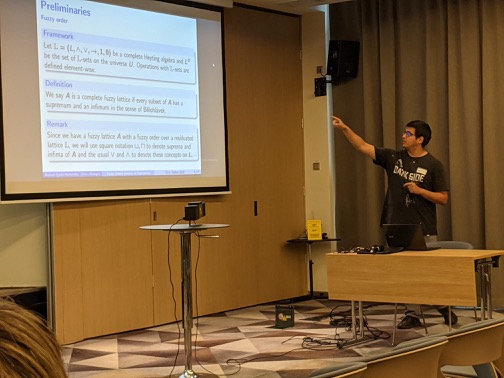
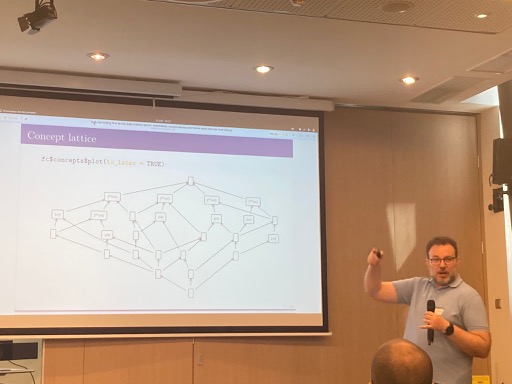
Conference papers accepted
01/07/22/10:17 Filed in: Conference papers
N. Madrid, M. Ojeda-Aciego. Nuevos resultados sobre el f-índice de inclusión. Simp. Nacional sobre Tecnología y Lógica Difusa (ESTYLF), Toledo, 2022.
ABSTRACT En este documento presentamos alguno de los últimos resultados teóricos obtenidos sobre el f-índice de inclusión. Estos resultados motivan el uso de dicho índice como una nueva forma de representar la inclusión entre dos conjuntos difusos y como un operador de inferencia lógica. En este resumen recordamos dos: se satisfacen los axiomas de Sinha-Dougherty (convenientemente adaptados al marco teórico del f-índice de inclusión) y, además, corresponde a una elección optimal de una implicación difusa residuada para llevar a cabo la inferencia Modus Ponens.
I.P. Cabrera, P. Cordero, E. Muñoz-Velasco, Manuel Ojeda-Aciego. Conexiones de Galois relacionales difusas entre digrafos transitivos difusos. Simp. Nacional sobre Tecnología y Lógica Difusa (ESTYLF), Toledo, 2022.
ABSTRACT Presentamos una versión difusa de la noción de conexión de Galois relacional entre grafos dirigidos transitivos difusos (digrafos T-difusos) en el entorno específico en el que el álgebra subyacente de valores de verdad es un álgebra de Heyting completa. Los componentes de dicha conexión de Galois difusa son relaciones difusas que satisfacen ciertas propiedades razonables expresadas en términos de lo que denominamos "full powering". Además, proporcionamos una condición necesaria y suficiente bajo la cual es posible construir un adjunto a la derecha para una relación difusa dada entre un digrafo T-difuso y un conjunto no estructurado.
F. Pérez-Gámez, P. Cordero, M. Enciso, Á. Mora, M. Ojeda-Aciego. Análisis de conceptos formales bajo una visión intuicionista. Simp. Nacional sobre Tecnología y Lógica Difusa (ESTYLF), Toledo, 2022.
ABSTRACT Contextos formales parciales son contextos con tres valores que nos permite establecer cuando una propiedad se satisface o no. Además, permite representar situaciones en las que existe ignorancia sobre si una propiedad se satisface o no. Esto puede ser bastante útil en diferentes aspectos como cuando hay información desconocida o, también, cuando aparece la información desconocida debido a intentamos reducir el tamaño de un contexto formal agrupando filas. En este artículo extendemos estas nociones e ideas para añadir grados de conocimiento.
M. Ojeda-Hernandez, I. P. Cabrera, P. Cordero, E. Muñoz-Velasco. Un estudio preliminar de relaciones de clausura difusas. Simp. Nacional sobre Tecnología y Lógica Difusa (ESTYLF), Toledo, 2022.
ABSTRACT Los operadores de clausura son elementos clave de las matemáticas tanto puras como aplicadas. Esta contribución trata la búsqueda de una definición de relación de clausura difusa que extienda de manera apropiada el concepto de operador de clausura en el marco de los retículos completos difusos. La condición que se busca extender es la correspondencia biyectiva con los sistemas de clausura difusos. Se parte de las definiciones existentes de relación de clausura difusa y se acotan las condiciones necesarias para la existencia de la biyección hasta que se encuentran las condiciones óptimas.
P. Cordero, M. Enciso, D. López-Rodríguez, Á. Mora. Uso de Lógica Difusa para Construir un Sistema Recomendador Médico. Simp. Nacional sobre Tecnología y Lógica Difusa (ESTYLF), Toledo, 2022.
ABSTRACT En este trabajo, se propone un motor automatizado basado en la Lógica de Simplificación difusa para realizar sugerencias a los usuarios.
Los sistemas de recomendación conversacional han demostrado ser un buen enfoque en telemedicina, construyendo un diálogo entre el usuario y el recomendador basado en las preferencias del usuario proporcionadas en cada paso de la conversación. Aquí proponemos un sistema de recomendación conversacional para el diagnóstico médico utilizando la lógica difusa.
ABSTRACT En este documento presentamos alguno de los últimos resultados teóricos obtenidos sobre el f-índice de inclusión. Estos resultados motivan el uso de dicho índice como una nueva forma de representar la inclusión entre dos conjuntos difusos y como un operador de inferencia lógica. En este resumen recordamos dos: se satisfacen los axiomas de Sinha-Dougherty (convenientemente adaptados al marco teórico del f-índice de inclusión) y, además, corresponde a una elección optimal de una implicación difusa residuada para llevar a cabo la inferencia Modus Ponens.
I.P. Cabrera, P. Cordero, E. Muñoz-Velasco, Manuel Ojeda-Aciego. Conexiones de Galois relacionales difusas entre digrafos transitivos difusos. Simp. Nacional sobre Tecnología y Lógica Difusa (ESTYLF), Toledo, 2022.
ABSTRACT Presentamos una versión difusa de la noción de conexión de Galois relacional entre grafos dirigidos transitivos difusos (digrafos T-difusos) en el entorno específico en el que el álgebra subyacente de valores de verdad es un álgebra de Heyting completa. Los componentes de dicha conexión de Galois difusa son relaciones difusas que satisfacen ciertas propiedades razonables expresadas en términos de lo que denominamos "full powering". Además, proporcionamos una condición necesaria y suficiente bajo la cual es posible construir un adjunto a la derecha para una relación difusa dada entre un digrafo T-difuso y un conjunto no estructurado.
F. Pérez-Gámez, P. Cordero, M. Enciso, Á. Mora, M. Ojeda-Aciego. Análisis de conceptos formales bajo una visión intuicionista. Simp. Nacional sobre Tecnología y Lógica Difusa (ESTYLF), Toledo, 2022.
ABSTRACT Contextos formales parciales son contextos con tres valores que nos permite establecer cuando una propiedad se satisface o no. Además, permite representar situaciones en las que existe ignorancia sobre si una propiedad se satisface o no. Esto puede ser bastante útil en diferentes aspectos como cuando hay información desconocida o, también, cuando aparece la información desconocida debido a intentamos reducir el tamaño de un contexto formal agrupando filas. En este artículo extendemos estas nociones e ideas para añadir grados de conocimiento.
M. Ojeda-Hernandez, I. P. Cabrera, P. Cordero, E. Muñoz-Velasco. Un estudio preliminar de relaciones de clausura difusas. Simp. Nacional sobre Tecnología y Lógica Difusa (ESTYLF), Toledo, 2022.
ABSTRACT Los operadores de clausura son elementos clave de las matemáticas tanto puras como aplicadas. Esta contribución trata la búsqueda de una definición de relación de clausura difusa que extienda de manera apropiada el concepto de operador de clausura en el marco de los retículos completos difusos. La condición que se busca extender es la correspondencia biyectiva con los sistemas de clausura difusos. Se parte de las definiciones existentes de relación de clausura difusa y se acotan las condiciones necesarias para la existencia de la biyección hasta que se encuentran las condiciones óptimas.
P. Cordero, M. Enciso, D. López-Rodríguez, Á. Mora. Uso de Lógica Difusa para Construir un Sistema Recomendador Médico. Simp. Nacional sobre Tecnología y Lógica Difusa (ESTYLF), Toledo, 2022.
ABSTRACT En este trabajo, se propone un motor automatizado basado en la Lógica de Simplificación difusa para realizar sugerencias a los usuarios.
Los sistemas de recomendación conversacional han demostrado ser un buen enfoque en telemedicina, construyendo un diálogo entre el usuario y el recomendador basado en las preferencias del usuario proporcionadas en cada paso de la conversación. Aquí proponemos un sistema de recomendación conversacional para el diagnóstico médico utilizando la lógica difusa.
Journal paper accepted
30/05/22/11:27 Filed in: Journal paper
N. Madrid, C. Cornelis. Kitainik axioms do not characterize the class of inclusion measures based on contrapositive fuzzy implications. Information Sciences, 2022. To appear.
ABSTRACT In this short communication, we refute the conjecture by Fodor and Yager that the class of inclusion measures proposed by Kitainik coincides with that of inclusion measures based on contrapositive fuzzy implications. In particular, we show that the conjecture only holds when the considered universe of discourse is finite.
ABSTRACT In this short communication, we refute the conjecture by Fodor and Yager that the class of inclusion measures proposed by Kitainik coincides with that of inclusion measures based on contrapositive fuzzy implications. In particular, we show that the conjecture only holds when the considered universe of discourse is finite.
Journal papers accepted
30/05/22/10:10 Filed in: Journal papers
M. Ojeda-Hernández, I.P. Cabrera, P. Cordero and E. Muñoz-Velasco. Fuzzy Closure Relations. Fuzzy Sets and Systems, 2022. To appear
ABSTRACT The concept of closure operator is key in several branches of mathematics. In this paper, closure operators are extended to relational structures, more specifically to fuzzy relations in the framework of complete fuzzy lattices. The core of the work is the search for a suitable definition of (strong) fuzzy closure relation, that is, a fuzzy relation whose relation with fuzzy closure systems is one-to-one.The study of the properties of fuzzy closure systems and fuzzy relations helps narrow down this exploration until an appropriate definition is settled.
W. Conradie, D. Della Monica, E. Muñoz-Velasco, G. Sciavicco, I.E. Stan. Fuzzy Halpern and Shoham’s Interval Temporal Logics. Fuzzy Sets and Systems, 2022. To appear
ABSTRACT The most representative interval temporal logic, called HS, was introduced by Halpern and Shoham in the nineties. Recently, HS has been proposed as a suitable formalism for modern artificial intelligence applications; however, when dealing with real-life data one is not always able to express temporal re- lations and propositional labels in a definite, crisp way. In this paper, follow- ing the seminal ideas of Fitting and Zadeh, we present a fuzzy generalization of HS, called FHS, that partially solves such problems of expressive power. We study FHS from both a theoretical and an application standpoint: first, we discuss its syntax, semantics, expressive power, and satisfiability problem; then, we define and solve the time series FHS finite model checking problem, to serve as the basis of future applications.
ABSTRACT The concept of closure operator is key in several branches of mathematics. In this paper, closure operators are extended to relational structures, more specifically to fuzzy relations in the framework of complete fuzzy lattices. The core of the work is the search for a suitable definition of (strong) fuzzy closure relation, that is, a fuzzy relation whose relation with fuzzy closure systems is one-to-one.The study of the properties of fuzzy closure systems and fuzzy relations helps narrow down this exploration until an appropriate definition is settled.
W. Conradie, D. Della Monica, E. Muñoz-Velasco, G. Sciavicco, I.E. Stan. Fuzzy Halpern and Shoham’s Interval Temporal Logics. Fuzzy Sets and Systems, 2022. To appear
ABSTRACT The most representative interval temporal logic, called HS, was introduced by Halpern and Shoham in the nineties. Recently, HS has been proposed as a suitable formalism for modern artificial intelligence applications; however, when dealing with real-life data one is not always able to express temporal re- lations and propositional labels in a definite, crisp way. In this paper, follow- ing the seminal ideas of Fitting and Zadeh, we present a fuzzy generalization of HS, called FHS, that partially solves such problems of expressive power. We study FHS from both a theoretical and an application standpoint: first, we discuss its syntax, semantics, expressive power, and satisfiability problem; then, we define and solve the time series FHS finite model checking problem, to serve as the basis of future applications.
ESTYLF conference organized
The FLAIR group organises ESTYLF (the Spanish Conference on Fuzzy Logic and Technology) as an event of CAEPIA (Spanish conference on Artificial Intelligence), within the Spanish Conference of Informatics (CEDI) in Málaga
The new edition of the Spanish Conference on Fuzzy Logic and Technology (ESTYLF) has been organised by our group, being Manuel Ojeda-Aciego the Scientific Chair (together with Susana Montes from Univ. Oviedo).
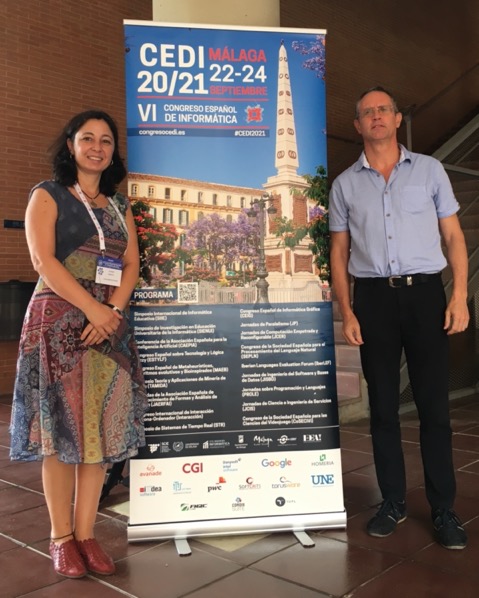
We also participate as co-editors of the proceedings of CAEPIA'21, published by Springer.
Conference papers accepted
12/07/21/11:10 Filed in: Conference papers
O. Krídlo, M. Ojeda-Aciego. Sugeno integral for Atanassov intuitionistic fuzzy sets. Eur. Symp. on Computational Intelligence and Mathematics, Budapest, 2021.
ABSTRACT We work on the recently proposed relationship between L-fuzzy measures and integrals and isotone concept-forming operators on a Girard monoid in order to define a generalized notion of Sugeno integral for Atanassov Intuitionistic L-fuzzy sets. We also provide some examples on the practical interpretation of the new proposed notion.
M. Ojeda-Aciego, J.M. Rodriguez-Jimenez. Advances in forgery detection of driving licences using truthfulness degrees. Eur. Symp. on Computational Intelligence and Mathematics, Budapest, 2021.
ABSTRACT We develop a methodology which allows to detect forgeries in driving licences based on an analysis of two serial codes usually present in licences issued in European countries. Results from the initial analysis of licences issued in France and Italy are presented.
ABSTRACT We work on the recently proposed relationship between L-fuzzy measures and integrals and isotone concept-forming operators on a Girard monoid in order to define a generalized notion of Sugeno integral for Atanassov Intuitionistic L-fuzzy sets. We also provide some examples on the practical interpretation of the new proposed notion.
M. Ojeda-Aciego, J.M. Rodriguez-Jimenez. Advances in forgery detection of driving licences using truthfulness degrees. Eur. Symp. on Computational Intelligence and Mathematics, Budapest, 2021.
ABSTRACT We develop a methodology which allows to detect forgeries in driving licences based on an analysis of two serial codes usually present in licences issued in European countries. Results from the initial analysis of licences issued in France and Italy are presented.
Journal paper accepted
25/01/21/08:47 Filed in: Journal paper
N. Madrid and M. Ojeda-Aciego. Measures of inclusion and entropy based on the φ-index of inclusion. Fuzzy Sets and Systems, 2021. To appear
ABSTRACT Surprisingly, despite that fuzzy sets were introduced more than fifty years ago, there is not consensus yet about how to extend the notion of inclusion in such a framework. Recently, alternatively to previous methods in the literature, we introduced an approach in which we make use of the so-called φ-index of inclusion. This approach has a main difference with respect to previous ones: the degree of inclusion is identified with a function instead of with a value in [0,1], although such a feature makes it difficult to compare the φ-index of inclusion with existing axiomatic approaches concerning measures of inclusion. This is the reason why in this paper we define two different and natural measures of inclusion by means of the φ-index of inclusion and, then, show that both measures satisfy some standard axiomatic approaches about measures of inclusion in the literature. In addition, taking into account the relationship of fuzzy entropy with Young axioms for measures of inclusion, we present also a measure of entropy based on the φ-index of inclusion that is in accordance with the axioms of De Luca and Termini.
ABSTRACT Surprisingly, despite that fuzzy sets were introduced more than fifty years ago, there is not consensus yet about how to extend the notion of inclusion in such a framework. Recently, alternatively to previous methods in the literature, we introduced an approach in which we make use of the so-called φ-index of inclusion. This approach has a main difference with respect to previous ones: the degree of inclusion is identified with a function instead of with a value in [0,1], although such a feature makes it difficult to compare the φ-index of inclusion with existing axiomatic approaches concerning measures of inclusion. This is the reason why in this paper we define two different and natural measures of inclusion by means of the φ-index of inclusion and, then, show that both measures satisfy some standard axiomatic approaches about measures of inclusion in the literature. In addition, taking into account the relationship of fuzzy entropy with Young axioms for measures of inclusion, we present also a measure of entropy based on the φ-index of inclusion that is in accordance with the axioms of De Luca and Termini.
Journal paper accepted
09/11/20/10:47 Filed in: Journal paper
O. Krídlo, M. Ojeda-Aciego. Classifying adjoint pairs and adjoint triples in an Atanassov L-fuzzy framework. IEEE Transactions on Fuzzy Systems, 2021. To appear
ABSTRACT We study and classify a family of adjoint pairs and adjoint triples for Atanassov $L$-fuzzy framework based on a complete residuated lattice satisfying the double negation law.
ABSTRACT We study and classify a family of adjoint pairs and adjoint triples for Atanassov $L$-fuzzy framework based on a complete residuated lattice satisfying the double negation law.
Conference papers accepted
12/05/20/10:16 Filed in: Conference papers
Inma P. Cabrera, P. Cordero, E. Muñoz and M. Ojeda-Aciego. Galois connections between unbalanced structures in a fuzzy framework. 18th International Conference on Information Processing and Management of Uncertainty in Knowledge-Based Systems (IPMU), Lisboa, 2020.
ABSTRACT The construction of Galois connections between unbalanced structures has received considerable attention in the recent years.
In a nutshell, the problem is to find a right adjoint of a mapping defined between sets with unbalanced structure; in this paper we survey recent results obtained in this framework, focusing specially on the fuzzy structures that have been considered so far in this context: fuzzy preposets, fuzzy preordered structures, and fuzzy T-digraphs.
F. Valverde, C. Peláez, I.P. Cabrera, P. Cordero, and M. Ojeda-Aciego. Exploratory Data Analysis of Multi-label Classification Tasks with Formal Context Analysis. Concept Lattices and their Applications (CLA), Tallinn, 2020.
ABSTRACT We introduce a new framework, Formal Context Analysis (FxA), for the exploratory analysis of data tasks cast in the guise of formal contexts. FxA gathers a number of results from Formal Concpt Analysis, Formal Independence Analysis and Formal Equivalence Analysis to enhance the establishment and processing of hypothesis about data. We apply this framework to the study of the Multi-label Classification (MLC) task and obtain a number of results of technical nature about how the induction mechanism for MLC classifiers should proceed. The application is based on an analysis of multilabel classification from the standpoint of FxA.
N. Madrid and M. Ojeda-Aciego. Inconsistency in fuzzy logic systems. International Conference on Computational and Mathematical Methods in Science and Engineering (CMMSE), Rota, 2020.
ABSTRACT Different notions of consistency which are equivalent in the classical case are no longer equivalent in a fuzzy framework; this leads to different potential notions of consistency in a fuzzy setting. The underlying problem is to consider "consistency" as a crisp property; instead, we propose to consider a gradual notion of consistency, and different measures of consistency are introduced and analyzed.
N. Madrid. Towards the use of quantile fuzzy transforms for the construction of fuzzy association rules. IEEE Int Conf on Fuzzy Systems (FUZZ-IEEE), Glasgow, 2020.
ABSTRACT This paper analyzes the possibility of defining fuzzy association rules by means of direct quantiles F-transforms. The set of fuzzy association rules is used in a fuzzy inference system, defined by means of the inverse quantile F-transform. The obtained inference system reminds the Takagi-Sugeno one due to the use of a weighted sum to perform the inference. However, there is an important difference: the output is a fuzzy set and, as a result, we require the use of a defuzzification procedure. In addition, in this paper we prove experimentally that the fuzzy set obtained as the output of the proposed inference system is related to a probability distribution.
N. Madrid and E. Ramírez-Poussa. Representative Set of Objects in Rough Sets Based on Galois Connections. International Joint Conference on Rough Sets (IJCRS), La Habana, 2020.
ABSTRACT This paper introduces a novel definition, called representative set of objects of a decision class, in the framework of decision systems based on rough sets. The idea behind such a notion is to consider subsets of objects that characterize the different classes given by a decision system. Besides the formal definition of representative set of objects of a decision class, we present different mathematical properties of such sets and a relationship with classification tasks based on rough sets.
ABSTRACT The construction of Galois connections between unbalanced structures has received considerable attention in the recent years.
In a nutshell, the problem is to find a right adjoint of a mapping defined between sets with unbalanced structure; in this paper we survey recent results obtained in this framework, focusing specially on the fuzzy structures that have been considered so far in this context: fuzzy preposets, fuzzy preordered structures, and fuzzy T-digraphs.
F. Valverde, C. Peláez, I.P. Cabrera, P. Cordero, and M. Ojeda-Aciego. Exploratory Data Analysis of Multi-label Classification Tasks with Formal Context Analysis. Concept Lattices and their Applications (CLA), Tallinn, 2020.
ABSTRACT We introduce a new framework, Formal Context Analysis (FxA), for the exploratory analysis of data tasks cast in the guise of formal contexts. FxA gathers a number of results from Formal Concpt Analysis, Formal Independence Analysis and Formal Equivalence Analysis to enhance the establishment and processing of hypothesis about data. We apply this framework to the study of the Multi-label Classification (MLC) task and obtain a number of results of technical nature about how the induction mechanism for MLC classifiers should proceed. The application is based on an analysis of multilabel classification from the standpoint of FxA.
N. Madrid and M. Ojeda-Aciego. Inconsistency in fuzzy logic systems. International Conference on Computational and Mathematical Methods in Science and Engineering (CMMSE), Rota, 2020.
ABSTRACT Different notions of consistency which are equivalent in the classical case are no longer equivalent in a fuzzy framework; this leads to different potential notions of consistency in a fuzzy setting. The underlying problem is to consider "consistency" as a crisp property; instead, we propose to consider a gradual notion of consistency, and different measures of consistency are introduced and analyzed.
N. Madrid. Towards the use of quantile fuzzy transforms for the construction of fuzzy association rules. IEEE Int Conf on Fuzzy Systems (FUZZ-IEEE), Glasgow, 2020.
ABSTRACT This paper analyzes the possibility of defining fuzzy association rules by means of direct quantiles F-transforms. The set of fuzzy association rules is used in a fuzzy inference system, defined by means of the inverse quantile F-transform. The obtained inference system reminds the Takagi-Sugeno one due to the use of a weighted sum to perform the inference. However, there is an important difference: the output is a fuzzy set and, as a result, we require the use of a defuzzification procedure. In addition, in this paper we prove experimentally that the fuzzy set obtained as the output of the proposed inference system is related to a probability distribution.
N. Madrid and E. Ramírez-Poussa. Representative Set of Objects in Rough Sets Based on Galois Connections. International Joint Conference on Rough Sets (IJCRS), La Habana, 2020.
ABSTRACT This paper introduces a novel definition, called representative set of objects of a decision class, in the framework of decision systems based on rough sets. The idea behind such a notion is to consider subsets of objects that characterize the different classes given by a decision system. Besides the formal definition of representative set of objects of a decision class, we present different mathematical properties of such sets and a relationship with classification tasks based on rough sets.
Journal paper accepted
13/03/20/10:32 Filed in: Journal paper
N. Madrid, M. Ojeda. On contradiction and inclusion using functional degrees. International Journal of Computational Intelligence Systems 13(1):464-471, 2020.
ABSTRACT The notion of inclusion is a cornerstone in set theory and therefore, its generalization in fuzzy set theory is of great interest. The degree of f-inclusion is one generalization of such a notion that differs from others existing in the literature because the degree of inclusion is considered as a mapping instead of a value in the unit interval. On the other hand, the degree of f-weak-contradiction was introduced to represent the contradiction between two fuzzy sets via a mapping and its definition has many similarities with the f-degree of inclusion. This suggests the existence of relations between both f-degrees. Specifically, following this line, we analyse the relationship between the f-degree of inclusion and the f-degree of contradiction via the complement of fuzzy sets and Galois connections.
ABSTRACT The notion of inclusion is a cornerstone in set theory and therefore, its generalization in fuzzy set theory is of great interest. The degree of f-inclusion is one generalization of such a notion that differs from others existing in the literature because the degree of inclusion is considered as a mapping instead of a value in the unit interval. On the other hand, the degree of f-weak-contradiction was introduced to represent the contradiction between two fuzzy sets via a mapping and its definition has many similarities with the f-degree of inclusion. This suggests the existence of relations between both f-degrees. Specifically, following this line, we analyse the relationship between the f-degree of inclusion and the f-degree of contradiction via the complement of fuzzy sets and Galois connections.
Journal paper accepted
26/02/20/08:36 Filed in: Journal paper
E. Ramírez-Poussa, N. Madrid, J. Medina. Rough Sets based on Galois connections. Applied Mathematics and Computer Science 30(2):299-313, 2020.
ABSTRACT Rough set theory is an important tool to extract knowledge from relational databases. The original definitions of the approximation operators are based on an indiscernibility relation, which is an equivalence relation. Later, different papers have motivated the possibility of considering arbitrary relations nevertheless, when arbitrary relations are considered, the original definitions given by Pawlak may lose fundamental properties. This paper proposes a possible solution of the arisen problems by presenting an alternative definition of the approximation operators based on the closure and the interior operators obtained from an isotone Galois connection. We prove that the proposed definition satisfies interesting properties and that it also improves object classification tasks.
ABSTRACT Rough set theory is an important tool to extract knowledge from relational databases. The original definitions of the approximation operators are based on an indiscernibility relation, which is an equivalence relation. Later, different papers have motivated the possibility of considering arbitrary relations nevertheless, when arbitrary relations are considered, the original definitions given by Pawlak may lose fundamental properties. This paper proposes a possible solution of the arisen problems by presenting an alternative definition of the approximation operators based on the closure and the interior operators obtained from an isotone Galois connection. We prove that the proposed definition satisfies interesting properties and that it also improves object classification tasks.
Journal paper accepted
10/02/20/08:47 Filed in: Journal paper
I.P. Cabrera, P. Cordero, E. Muñoz-Velasco, M. Ojeda-Aciego, B. De Baets. Relational Galois connections between transitive fuzzy digraphs. Mathematical Methods in the Applied Sciences 43(9):5673-5680, 2020.
ABSTRACT Fuzzy directed graphs are often chosen as the datatype to model and implement solutions of several problems in the applied sciences. Galois connections have also shown to be useful both in theoretical and in practical problems. In this paper, the notion of relational Galois connection is extended to be applied between transitive fuzzy directed graphs. In this framework, the components of the connection are crisp relations satisfying certain reasonable properties given in terms of the so-called full powering.
ABSTRACT Fuzzy directed graphs are often chosen as the datatype to model and implement solutions of several problems in the applied sciences. Galois connections have also shown to be useful both in theoretical and in practical problems. In this paper, the notion of relational Galois connection is extended to be applied between transitive fuzzy directed graphs. In this framework, the components of the connection are crisp relations satisfying certain reasonable properties given in terms of the so-called full powering.
FSTA 2020
04/02/20/13:54 Filed in: Conference participation
Fuzzy Set Theory and Applications, FSTA 2020
An intense week in Liptovský Ján, Slovakia, full of interaction with other researchers who work in different topics all within the fuzzy umbrella, where we presented the work "Isotone L-fuzzy FCA and categories L-ChuCors and L-Rel".
The next steps on our research line on Galois connections were discussed with Bernard De Baets, and further work on fuzzy mathematical morphology and the F-transform was discussed with Irina Perfilieva, who will be visiting us in some months.
Journal paper accepted
20/01/20/11:07 Filed in: Journal paper
I.P. Cabrera, P. Cordero, E. Muñoz-Velasco, M. Ojeda-Aciego, B. De Baets. Relational Galois connections between transitive digraphs: characterization and construction. Information Sciences 519:439-450, 2020.
ABSTRACT This paper focuses on a twofold relational generalization of the notion of Galois connection. It is twofold because it is defined between sets endowed with arbitrary transitive relations and, moreover, both components of the connection are relations, not necessarily functions. A characterization theorem of the notion of relational Galois connection is provided and, then, it is proved that a suitable notion of closure can be obtained within this framework. Finally, we state a necessary and sufficient condition that allows to build a relational Galois connection starting from a single transitive digraph and a single binary relation.
ABSTRACT This paper focuses on a twofold relational generalization of the notion of Galois connection. It is twofold because it is defined between sets endowed with arbitrary transitive relations and, moreover, both components of the connection are relations, not necessarily functions. A characterization theorem of the notion of relational Galois connection is provided and, then, it is proved that a suitable notion of closure can be obtained within this framework. Finally, we state a necessary and sufficient condition that allows to build a relational Galois connection starting from a single transitive digraph and a single binary relation.
Conference papers accepted
15/01/20/08:51 Filed in: Conference papers
N. Madrid and M. Ojeda-Aciego. New measures of inclusion between fuzzy sets in terms of the f-index of inclusion. 24th Eur Conf on Artificial Intelligence (ECAI), Santiago de Compostela, 2020.
ABSTRACT The notion of inclusion is one of the most basic relations between sets, however, there is not a consensus about how to extend such a notion in fuzzy set theory. We introduce an alternative approach to previous methods in the literature in which we make use of the so-called f-index of inclusion. This approach has a main difference with respect to previous ones: instead of a value in [0,1], the measure of inclusion is identified with a function.
In this paper, using the f-index of inclusion we define two measures of inclusion in the standard sense, i.e., taking a value in [0,1] and then, we show that both measures are in accordance with the standard axiomatic approaches about measures of inclusion in the literature.
W. Conradie, D. Della Monica, E, Muñoz-Velasco and G. Sciavicco. An Approach to Fuzzy Modal Logic of Time Intervals. 24th Eur Conf on Artificial Intelligence (ECAI), Santiago de Compostela, 2020.
ABSTRACT Temporal reasoning based on intervals is nowadays ubiquitous in artificial intelligence, and the most representative interval temporal logic, called HS, was introduced by Halpern and Shoham in the eighties. There has been a great effort in the past in studying the expressive power and computational properties of the satisfiability problem for HS and its fragments, but only recently HS has been proposed as a suitable formalism for artificial intelligence applications. Such applications highlighted some of the intrinsic limits of HS: sometimes, when dealing with real-life data, many times one is not able to express temporal relations and propositional labels in a definite, crisp way. In this paper, following the seminal ideas of Fitting and Zadeh, among others, we present a fuzzy generalization of HS that partially solves such problems of expressive power, and we prove that, as in the crisp case, its satisfiability problem is generally undecidable.
ABSTRACT The notion of inclusion is one of the most basic relations between sets, however, there is not a consensus about how to extend such a notion in fuzzy set theory. We introduce an alternative approach to previous methods in the literature in which we make use of the so-called f-index of inclusion. This approach has a main difference with respect to previous ones: instead of a value in [0,1], the measure of inclusion is identified with a function.
In this paper, using the f-index of inclusion we define two measures of inclusion in the standard sense, i.e., taking a value in [0,1] and then, we show that both measures are in accordance with the standard axiomatic approaches about measures of inclusion in the literature.
W. Conradie, D. Della Monica, E, Muñoz-Velasco and G. Sciavicco. An Approach to Fuzzy Modal Logic of Time Intervals. 24th Eur Conf on Artificial Intelligence (ECAI), Santiago de Compostela, 2020.
ABSTRACT Temporal reasoning based on intervals is nowadays ubiquitous in artificial intelligence, and the most representative interval temporal logic, called HS, was introduced by Halpern and Shoham in the eighties. There has been a great effort in the past in studying the expressive power and computational properties of the satisfiability problem for HS and its fragments, but only recently HS has been proposed as a suitable formalism for artificial intelligence applications. Such applications highlighted some of the intrinsic limits of HS: sometimes, when dealing with real-life data, many times one is not able to express temporal relations and propositional labels in a definite, crisp way. In this paper, following the seminal ideas of Fitting and Zadeh, among others, we present a fuzzy generalization of HS that partially solves such problems of expressive power, and we prove that, as in the crisp case, its satisfiability problem is generally undecidable.
Journal paper accepted
28/11/19/13:33 Filed in: Journal paper
N. Madrid and M. Ojeda-Aciego. Multi-adjoint lattices from adjoint triples with involutive negation. Fuzzy Sets and Systems 405:88-105, 2021.
ABSTRACT We focus primarily on the use of involutive negations in adjoint triples and the satisfiability of the contraposition law. Instead of considering natural negations, such as n(x)=x -> 0, we consider an arbitrary involutive negation and an arbitrary adjoint triple. Then, we construct a multiadjoint lattice (an algebraic structure with several conjunctions and implications) with the help of two new adjoint triples defined from the original one and the involutive negation considered. Finally, we present several results that relate the different implications and conjunctions appearing in the mentioned multi-adjoint lattice in terms of the logical laws of contraposition, interchange and exportation.
ABSTRACT We focus primarily on the use of involutive negations in adjoint triples and the satisfiability of the contraposition law. Instead of considering natural negations, such as n(x)=x -> 0, we consider an arbitrary involutive negation and an arbitrary adjoint triple. Then, we construct a multiadjoint lattice (an algebraic structure with several conjunctions and implications) with the help of two new adjoint triples defined from the original one and the involutive negation considered. Finally, we present several results that relate the different implications and conjunctions appearing in the mentioned multi-adjoint lattice in terms of the logical laws of contraposition, interchange and exportation.
HARMONIC'19
12/11/19/13:00 Filed in: Workshop participation
Herramientas Difusas Para el Razonamiento No Canónico, HARMONIC'19
We have had a nice extended week-end in Grazalema where the workshop HARMONIC'19 has been held. We had a number of interesting discussions on preliminary ideas for future work and prospects for new collaborations.
We participated with two contributions: the first one was done by Domingo López, who presented the recent R package developed for dealing with fuzzy implications "fcaR, an R package to handle fuzzy implications: design of a recommendation system for medical diagnosis"; the second contribution was a joint paper together with our colleagues Fran Valverde and Carmen Peláez from Univ. Carlos III Madrid entitled "On FXA for data analysis".
ESCIM'19
09/10/19/13:33 Filed in: Conference participation
European Symposium on Computational Intelligence and Mathematics (ESCIM). Toledo, Spain, October 2-5, 2019
Just back from a very intense ESCIM'19, a small symposium with a nice working atmosphere.This year it has been held in Toledo, in the old premises of St Pedro Martir and Santa María convents, nowadays in use for the University Castilla-La Mancha.
The first keynote speaker was José Luis (Curro) Verdegay.
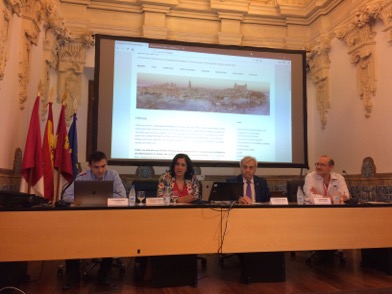
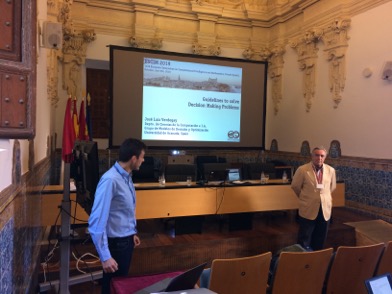
Our research team participated with three communications.
Nicolás Madrid presented Some relationships between the notions of f-inclusion and f-contradiction, in which we analyse the relationships between the notions of f-inclusion and f-weak-contradiction, and we present some theoretical results that relate both notions by means of negation operators (used to define complements of fuzzy sets) and Galois connections

Ondrej Krídlo presented On some categories underlying knowledge graphs, in which we propose a method to provide a categorical structure for RDF-based data representing descriptions of entities as a first step towards eventually providing an internal logic which enables to focus on analysis of properties of entities.
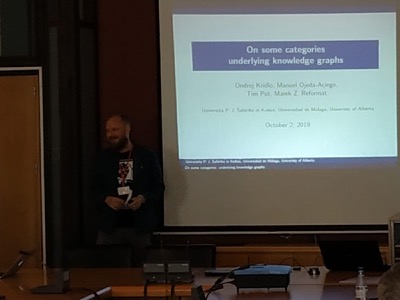
Finally, Ángel Mora presented Interactive search by means of the minimal generators, where, we provide a novel lazy algorithm with polynomial delay in which minimal generators are used as forks in a map to guide an interactive search.

EUSFLAT'19
13/09/19/11:28 Filed in: Conference participation
European Conference on Fuzzy Logic and Technology. Prague, September 9-13, 2019
We have attended the conference for presenting two papers, and participating in the Board Meeting of the journal Fuzzy Sets and Systems and the EUSFLAT General Assembly.

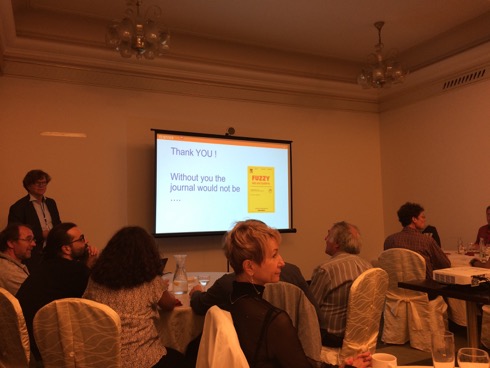
As usual, a good conference, very well-attended, with a friendly atmosphere which invites to meet a number of colleagues who work in our and related research topics.
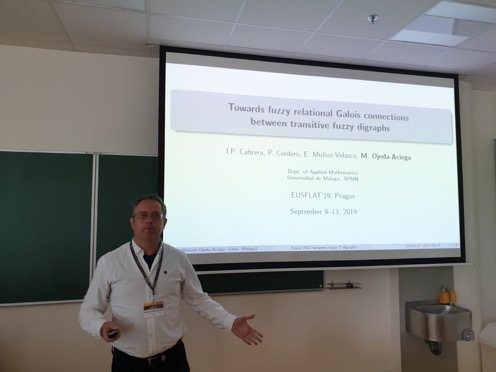

In the picture above, the heads of Lluis Godo, Francesc Esteva and Irina Perfilieva attending our talks in the first seats.

CMMSE'19
06/07/19/09:19 Filed in: Conference participation | Chairing
Intl Conf on Computational and Mathematical methods in Science and Engineering. Rota, July 1-5, 2019
Three members of the group attended CMMSE this year, where we organised a special session on "Mathematical Models for Computer Science".

Domingo López (left) presented Recommendations in CDSS using Fuzzy Formal Concept Analysis, and Nicolás Madrid (right) presented Towards a measure of inclusion from the index of inclusion between fuzzy sets.
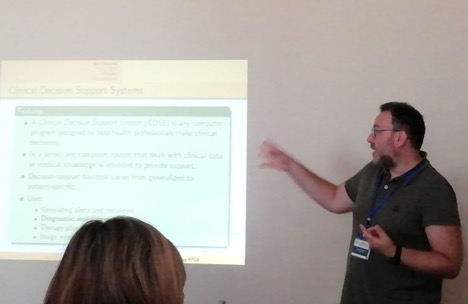
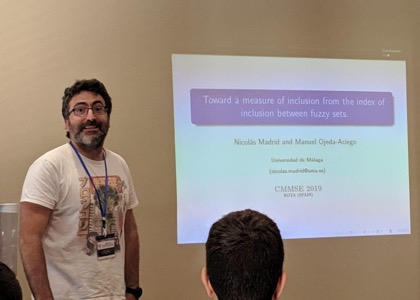
Last but not least, J.M. Rodríguez (left) presented Analysing patterns in false documents with Formal Concept Analysis to detect forgers, and Manuel Ojeda (right) presented Relational Galois connections between fuzzy t-digraphs.
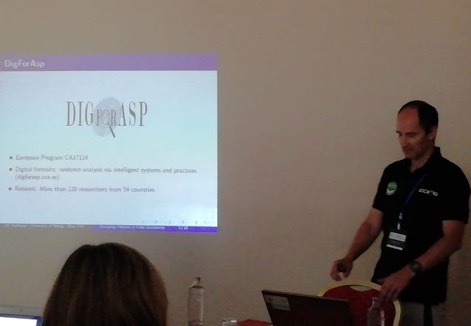
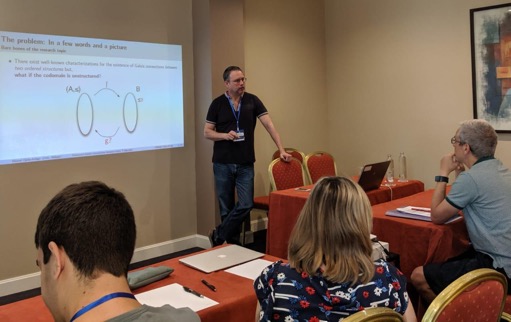
Conference papers accepted
09/07/19/09:10 Filed in: Conference papers
European Symposium on Computational Intelligence and Mathematics (ESCIM), Toledo, 2019.
- N. Madrid and M. Ojeda-Aciego. Some relationships between the notions of f-inclusion and f-contradiction.
ABSTRACT In this paper we analyse the relationships between the notions of f-inclusion and f-weak-contradiction. In particular, we present some theoretical results that relate both notions by means of negation operators (used to define complements of fuzzy sets) and Galois connections - O. Krídlo, M. Ojeda-Aciego, T. Put, and M. Reformat. On some categories underlying knowledge graphs.
ABSTRACT This paper proposes a method to provide a categorical structure for RDF-based data representing descriptions of entities. This is the first step towards our aim to further develop the underlying categorical structure so that we can eventually provide an internal logic which enables us to focus on analysis of properties of entities. - P. Cordero, M. Enciso, A. Mora, M. Ojeda-Aciego, and C. Rossi. Interactive search by means of the minimal generators.
ABSTRACT If-then rules are frequently used as basic elements for knowledge representation in several areas. In Formal Concept Analysis, these rules are the so-called implications and can be used to find minimal generators in a symbolic way by using logic. The computation of all minimal generators is exponential. Here, we provide a novel lazy algorithm with polynomial delay in which minimal generators are used as forks in a map to guide an interactive search..
Conference papers accepted
15/05/19/09:03 Filed in: Conference papers
J.M. Rodriguez-Jimenez and M. Ojeda-Aciego. Analysing patterns in false documents with Formal Concept Analysis to detect forgers. Intl Conference Computational and Mathematical Methods in Science and Engineering (CMMSE), Rota, 2019.
ABSTRACT Europe's system of open frontiers, commonly known as "Schengen", let people from different countries travel without problems crossing these frontiers. Different documents from these countries, not only European, could be found in road checkpoints, and Police forces have the problem that do not have an international database to know whether they are false or not. Some immigrants with legal problems in their original countries who need a new identity, or want a driver license to access to specific jobs, contact forgers who provide false documents with different levels of authenticity. Countries and Police Forces should improve their methodologies, by ensuring that staff is increasingly better able to detect false of falsified documents through their examination, and follow patterns to detect and ubícate these forgers. In this paper, we propose a method based on Formal Concept Analysis with negative attributes that allows Police forces analysing false documents, and provides a guide to enforce the detection of forgers.
I.P. Cabrera, P. Cordero, E. Muñoz-Velasco and M. Ojeda-Aciego. Relational Galois connections between fuzzy t-digraphs. Intl Conference Computational and Mathematical Methods in Science and Engineering (CMMSE), Rota, 2019.
ABSTRACT The notion of relational Galois connection is extended to be applied between fuzzy transitive directed graphs. In this framework, the components of the connection are crisp relations satisfying certain reasonable properties given in terms of the so-called full powering.
N. Madrid and M. Ojeda-Aciego. Towards a measure of inclusion from the index of inclusion between fuzzy sets. Intl Conference Computational and Mathematical Methods in Science and Engineering (CMMSE), Rota, 2019.
ABSTRACT Despite of the notion of inclusion between fuzzy sets has taken a great interest of a large number of researchers since Zadeh presented his seminal work in 1965, there is not a consensus about how to extend such a notion in fuzzy set theory yet. In this contribution we recall a recent fresh approach that represent the inclusion between two fuzzy sets by mean of a mapping (called index of inclusion) instead of a degree, as the standard approaches do. Moreover, we present a measure of inclusion (i.e. a degree) defined from our index of inclusion that allows to compare our approach directly with others in the literature.
D. López, A. Mora. Recommendations in CDSS using Fuzzy Formal Concept Analysis. Intl Conference Computational and Mathematical Methods in Science and Engineering (CMMSE), Rota, 2019.
ABSTRACT One of the hot topics in clinical research is hidden knowledge discovery in datasets with a high number of features (variables or attributes). We approach how to provide recommendations in Clinical Decision Support Systems (CDSS) to guide the experts in the diagnostic process. We work by mining graded implications from the dataset using the NEXTCLOSURE algorithm for Graded Attributes. Reasoning with these graded implications is done with the so-called Fuzzy Attribute Simplification Logic. As the number of graded implications mined from the fuzzy formal context is huge and with a high degree of redundancy, the objective is to obtain a equivalent set without redundancy, by applying the rules of the logic..
ABSTRACT Europe's system of open frontiers, commonly known as "Schengen", let people from different countries travel without problems crossing these frontiers. Different documents from these countries, not only European, could be found in road checkpoints, and Police forces have the problem that do not have an international database to know whether they are false or not. Some immigrants with legal problems in their original countries who need a new identity, or want a driver license to access to specific jobs, contact forgers who provide false documents with different levels of authenticity. Countries and Police Forces should improve their methodologies, by ensuring that staff is increasingly better able to detect false of falsified documents through their examination, and follow patterns to detect and ubícate these forgers. In this paper, we propose a method based on Formal Concept Analysis with negative attributes that allows Police forces analysing false documents, and provides a guide to enforce the detection of forgers.
I.P. Cabrera, P. Cordero, E. Muñoz-Velasco and M. Ojeda-Aciego. Relational Galois connections between fuzzy t-digraphs. Intl Conference Computational and Mathematical Methods in Science and Engineering (CMMSE), Rota, 2019.
ABSTRACT The notion of relational Galois connection is extended to be applied between fuzzy transitive directed graphs. In this framework, the components of the connection are crisp relations satisfying certain reasonable properties given in terms of the so-called full powering.
N. Madrid and M. Ojeda-Aciego. Towards a measure of inclusion from the index of inclusion between fuzzy sets. Intl Conference Computational and Mathematical Methods in Science and Engineering (CMMSE), Rota, 2019.
ABSTRACT Despite of the notion of inclusion between fuzzy sets has taken a great interest of a large number of researchers since Zadeh presented his seminal work in 1965, there is not a consensus about how to extend such a notion in fuzzy set theory yet. In this contribution we recall a recent fresh approach that represent the inclusion between two fuzzy sets by mean of a mapping (called index of inclusion) instead of a degree, as the standard approaches do. Moreover, we present a measure of inclusion (i.e. a degree) defined from our index of inclusion that allows to compare our approach directly with others in the literature.
D. López, A. Mora. Recommendations in CDSS using Fuzzy Formal Concept Analysis. Intl Conference Computational and Mathematical Methods in Science and Engineering (CMMSE), Rota, 2019.
ABSTRACT One of the hot topics in clinical research is hidden knowledge discovery in datasets with a high number of features (variables or attributes). We approach how to provide recommendations in Clinical Decision Support Systems (CDSS) to guide the experts in the diagnostic process. We work by mining graded implications from the dataset using the NEXTCLOSURE algorithm for Graded Attributes. Reasoning with these graded implications is done with the so-called Fuzzy Attribute Simplification Logic. As the number of graded implications mined from the fuzzy formal context is huge and with a high degree of redundancy, the objective is to obtain a equivalent set without redundancy, by applying the rules of the logic..
Conference papers accepted
13/04/19/08:57 Filed in: Conference papers
F.J. Valverde-Albacete, C. Peláez-Moreno, P. Cordero and M. Ojeda-Aciego. Formal Equivalence Analysis. Conference of the European Society for Fuzzy Logic and Technology (EUSFLAT), Prague, 2019
ABSTRACT Following R. Wille's lead and suggestion we set out to design a new kind of view onto a formal context analogous but different to Formal Concept Analysis (FCA) and Formal Independent Analysis (FIA). In this instance, we choose to analyse the information in the incidence table in terms of the partitions induced on the sets of objects and attributes by the some functions of single attributes and objects of the context. These functions constitute a left adjunction between sets of objects and attributes and we later lift this left adjunction to partitions of the objects and attributes. Therefore we refer to this new view onto the formal context as Formal Equivalence Analysis (FEA). Rather than looking on the effect of these partitions on set representation, as in Rough Sets, we try to make explicit the information in the context.
Inma P. Cabrera, P. Cordero, E. Muñoz and M. Ojeda-Aciego. Towards fuzzy relational Galois connections between fuzzy t-digraphs. Conference of the European Society for Fuzzy Logic and Technology (EUSFLAT), Prague, 2019
ABSTRACT In this paper, we give the first steps towards a formal definition of fuzzy relational Galois connection between fuzzy sets with arbitrary fuzzy transitive relations (fuzzy T-digraphs), where the two components of the connection are fuzzy relations. To this end we consider, on the one hand, our definition of relational Galois connection between T-digraphs in the crisp case; and, on the other hand, our definition of fuzzy relational Galois connection between fuzzy preorders. We compare both definitions and conclude that some (fuzzy) generalization of the notion of clique is needed.
ABSTRACT Following R. Wille's lead and suggestion we set out to design a new kind of view onto a formal context analogous but different to Formal Concept Analysis (FCA) and Formal Independent Analysis (FIA). In this instance, we choose to analyse the information in the incidence table in terms of the partitions induced on the sets of objects and attributes by the some functions of single attributes and objects of the context. These functions constitute a left adjunction between sets of objects and attributes and we later lift this left adjunction to partitions of the objects and attributes. Therefore we refer to this new view onto the formal context as Formal Equivalence Analysis (FEA). Rather than looking on the effect of these partitions on set representation, as in Rough Sets, we try to make explicit the information in the context.
Inma P. Cabrera, P. Cordero, E. Muñoz and M. Ojeda-Aciego. Towards fuzzy relational Galois connections between fuzzy t-digraphs. Conference of the European Society for Fuzzy Logic and Technology (EUSFLAT), Prague, 2019
ABSTRACT In this paper, we give the first steps towards a formal definition of fuzzy relational Galois connection between fuzzy sets with arbitrary fuzzy transitive relations (fuzzy T-digraphs), where the two components of the connection are fuzzy relations. To this end we consider, on the one hand, our definition of relational Galois connection between T-digraphs in the crisp case; and, on the other hand, our definition of fuzzy relational Galois connection between fuzzy preorders. We compare both definitions and conclude that some (fuzzy) generalization of the notion of clique is needed.
Conference paper accepted
11/03/19/08:51 Filed in: Conference papers
Inma P. Cabrera, P. Cordero, E. Muñoz and M. Ojeda-Aciego. A relational extension of Galois Connections. Intl Conf on Formal Concept Analysis (ICFCA), Frankfurt, 2019.
ABSTRACT In this paper, we focus on a twofold relational generalization of the notion of Galois connection. It is twofold because it is defined between sets endowed with arbitrary transitive relations and, moreover, both components of the connection are relations as well. Specifically, we introduce the notion of relational Galois connection between two transitive digraphs, study some of its properties and its relationship with other existing approaches in the literature.
ABSTRACT In this paper, we focus on a twofold relational generalization of the notion of Galois connection. It is twofold because it is defined between sets endowed with arbitrary transitive relations and, moreover, both components of the connection are relations as well. Specifically, we introduce the notion of relational Galois connection between two transitive digraphs, study some of its properties and its relationship with other existing approaches in the literature.
Journal paper accepted
25/03/19/22:48 Filed in: Journal paper
N. Madrid and M. Ojeda-Aciego. Functional degrees of inclusion and similarity between L-fuzzy sets. Fuzzy Sets and Systems 390:1-22, 2020
ABSTRACT Inclusion is one of the most basic relations between sets. In this paper, we show how to represent the degree of inclusion between two L-fuzzy sets via a function. Specifically, such a function determines the minimal modifications needed in an L-fuzzy set to be included (in Zadeh's sense) into another. To reach such a goal, firstly we present the notion of f-inclusion, which defines a family of crisp binary relations between L-fuzzy sets that are used as indexes of inclusion and, subsequently, we define the φ-degree of inclusion as the most suitable f-inclusion under certain criterion. In addition, we also present three φ-degrees of similarity definable from the φ-degree of inclusion. We show that the φ-degree of inclusion and the φ-degrees of similarities satisfy versions of many common axioms usually required for measures of inclusion and similarity in the literature.
ABSTRACT Inclusion is one of the most basic relations between sets. In this paper, we show how to represent the degree of inclusion between two L-fuzzy sets via a function. Specifically, such a function determines the minimal modifications needed in an L-fuzzy set to be included (in Zadeh's sense) into another. To reach such a goal, firstly we present the notion of f-inclusion, which defines a family of crisp binary relations between L-fuzzy sets that are used as indexes of inclusion and, subsequently, we define the φ-degree of inclusion as the most suitable f-inclusion under certain criterion. In addition, we also present three φ-degrees of similarity definable from the φ-degree of inclusion. We show that the φ-degree of inclusion and the φ-degrees of similarities satisfy versions of many common axioms usually required for measures of inclusion and similarity in the literature.
